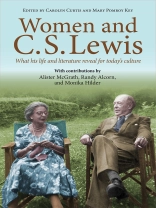Sexism in Narnia? Or Screwtape? Or amongst the Inklings? Many critics have labelled C.S. Lewis a sexist, even a misogynist. Did the life and writing of the hugely popular author and professor betray attitudes that today are unacceptable, even deplorable? The younger Lewis was criticized for a mysterious living arrangement with a woman, but his later marriage to an American poet, Joy Davidman, became a celebrated love story. As a writer he, along with J.R.R. Tolkien, formed a legendary literary group, the Inklings — but without women. In this collection of short essays, opinion pieces, and interviews, academics and writers come together to investigate these accusations. They include Alister Mc Grath, Randy Alcorn, Monika Hilder, Don W. King, Kathy Keller, Colin Duriez, Crystal Hurd, Jeanette Sears, David C. Downing, Malcolm Guite, and Holly Ordway. The resulting work, Women and C.S. Lewis, provides broad and satisfying answers.
Содержание
Contents
Acknowledgments 11
INTRODUCTIONS
Was C.S. Lewis sexist? Is he relevant today?
Carolyn Curtis 13
Not mere mortals
Dr Mary Pomroy Key 21
SECTION ONE
Lewis, the man – and the women in his life 27
Chapter One
The enduring influence of Flora Lewis
Dr Crystal Hurd 31
Chapter Two
What do we make of Lewis’ relationship with Mrs Moore?
Paul Mc Cusker 41
Chapter Three
Helen Joy Davidman (Mrs C.S. Lewis) 1915–1960: a portrait
Dr Lyle W. Dorsett 53
Chapter Four
Fire and Ice: why did Lewis marry Joy Davidman rather than
Ruth Pitter?
Dr Don W. King 65
Chapter Five
The Divine Comedy of C.S. Lewis and Dorothy L. Sayers
Dr Crystal L. Downing 73
Chapter Six
On Tolkien, the Inklings – and Lewis’ blindness to gender
Dr Alister Mc Grath 79
Chapter Seven
C.S. Lewis and the friends who apparently couldn’t really have
been his friends, but actually were
Colin Duriez 85
SECTION TWO
Lewis, the fiction author – how girls and women are
portrayed in his novels 93
Chapter One
Are The Chronicles of Narnia sexist?
Dr Devin Brown 95
Chapter Two
“The Abolition of Woman”: gender and hierarchy in Lewis’
Space Trilogy
Steven Elmore 109
Chapter Three
“She is one of the great ones.” The radical world of The Great Divorce
Dr Joy Jordan-Lake 121
Chapter Four
The Pilgrim’s Paradox: female characters in The Pilgrim’s Regress
Dr David C. Downing 127
Chapter Five
New perspectives: Till We Have Faces, The Four Loves, and other works
Andrew Lazo 135
SECTION THREE
Lewis, the poet – surprises from his poetry 145
Chapter One
Setting the man–woman thing to rights
Brad Davis 147
Chapter Two
Bridging the chasm between us
Kelly Belmonte 155
Chapter Three
Getting our goddesses together: Lewis and the feminine voice
in poetry
Revd Dr Malcolm Guite 161
SECTION FOUR
Lewis, the influencer – how his life and literature impact the
twenty-first century discussion about women 169
Chapter One
Jack, the “old woman” of Oxford: sexist or seer?
Dr Monika B. Hilder 173
Chapter Two
A generation longing for C.S. Lewis
Brett Mc Cracken 187
Chapter Three
From feminist to mere Christian
Dr Mary Poplin 191
Chapter Four
Lewis as teacher and servant… and my respectful disagreement
on women as priests
Revd Dr Jeanette Sears 199
Chapter Five
On women’s roles in the church: Lewis’ letters to me as a child lit
my way
Kathy Keller 209
Chapter Six
C.S. Lewis on love and sex
Dr Holly Ordway 217
Chapter Seven
Mistress for pleasure or wife for fruit?
Dr Michael Ward 223
Chapter Eight
Dorothy L. Sayers and C.S. Lewis: comrades against the zeitgeist
Kasey Macsenti 233
SECTION FIVE
Lewis, the mentor – how his views on women impact mine 243
Chapter One
Lewis inspired me to speak out for women
Randy Alcorn 245
Chapter Two
On being the father of immortals: lessons from “The Weight of Glory”
John Stonestreet 253
Chapter Three
More than a fairy princess: what Narnia teaches about being strong,
courageous women
Christin Ditchfield 261
CONCLUSION
What do Lewis’ life and literature reveal for today’s culture?
Carolyn Curtis 265
Questions for Reflection and Discussion 276
Endnotes 278
Об авторе
Alister E. Mc Grath (DPhil and DD, University of Oxford; Fellow of the Royal Society of Arts) is professor of theology, ministry, and education, and head of the Centre for Theology, Religion, and Culture at King’s College, London. He is the author and editor of numerous books, including the award-winning The Passionate Intellect: Christian Faith and the Discipleship of the Mind. A former atheist, he is respectful yet critical of the new atheist movement and regularly engages in debate and dialogue with its leaders.







![Обложка Brian Schrag & Julisa Rowe: Community Arts for God's Purposes [Chinese] 貼近神心意的社群藝術 Обложка Brian Schrag & Julisa Rowe: Community Arts for God's Purposes [Chinese] 貼近神心意的社群藝術](https://static.worldofdigitals.com/thumb_webp/740/9781645083740.webp)




